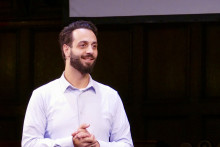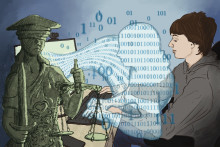According to Rezek, you can think of AI as a personal assistant. A helper who does the biggest preliminary work for you. 'Writing letters is faster and easier this way. About seventy to eighty percent can be done by a tool such as ChatGPT or Copilot, for example, and the remaining twenty to thirty percent you have to do yourself.'
How does it work? 'You can upload descriptions of vacant positions and ask for a summary or a selection of the five most important points. This provides you quickly with insight into which skills are needed or what work experience is required. You can then compare this with your own CV and then you consider whether the position suits you.'
Inaccuracies and mistakes
If that is the case, you can request the program to write a letter. 'It is best to add a piece of your own text, so that your style is reflected in the letter of application. It is important that you read the letter carefully, otherwise you will be found out to have used AI. Sometimes, an AI tool interprets a text differently causing the letter to contain inaccuracies or mistakes.'
A matter of taste
Then it is important to fine-tune. 'To give your own twist to the writing. You can give feedback, ask for sentences to be adjusted, or you can rewrite some parts yourself. And look at the style. Should it be more businesslike or informal? You can prompt the program to take care of that. Also, you can upload a small piece of text that you have written yourself and tell the AI program: ‘Take a look at this piece of text that I wrote, analyse my style, and rewrite the letter in my style.’ That is a powerful application which will ensure that ChatGPT or Copilot writes the application letter in your style. In the end, you can produce a letter that is to your liking fairly quickly.'
According to Rezek, it will no longer be possible to determine whether AI or a human wrote the letter. 'There are detection tools, but they do not work properly. In every single case, such an instrument will say that fifty percent was written by artificial intelligence and fifty percent by a human, even though that is not the case.'
 Equal opportunities
Equal opportunities
According to Rezek, a major advantage of the use of artificial intelligence is that differences between people who do and those who do not have a good pen are levelled. Is that a bad thing? They now stand the same chances. Is the ability to write a letter still a requirement? Or are the skills required shifting towards being able to apply AI properly in your work?'
These are questions the answers to which will emerge naturally in the near future. Either way, the advance of AI is going to have an impact on the labour market. 'Employment agencies are already noticing that the number of applicants for a position has increased enormously in the past two years. Where there used to be ten a week, they are now at fifty. It will just be easier to apply for a job.'
Subsequently, recruitment departments also use tools to make the first selection. 'A situation arises in which artificial intelligence is the first contact between the two parties. For example, a recruitment and selection agency can draw up a list of ten qualifications. The AI program then acts as a recruiter and creates a table with a score of the applicants that shows the extent to which they meet the criteria.'
Creativity
Artificial intelligence has become an integral part of our society. 'It not only affects job applications, but it can also be a required skill. That development is already taking place. At the moment, you need to know how to work with Outlook, for example, but knowing how to work with an AI tool may be added in the future.'
The discussion about creativity and personal input remains. Rezek: 'This is what discussions are often about. If you only use AI, you will be found out, because the text will be uninteresting to read and people drop out. Showing one’s own input and ideas will still be essential.'
For the future, Rezek foresees a situation in which that everyone will have an AI assistant. ‘ One that you always have with you, as an app on your smartphone, for example. It will get to know you, your preferences and your style. They can order a sandwich for you, make reservations in a restaurant, and also write letters for you.'
about wahbe rezek
 Wahbe Rezek studied Industrial Design Engineering at the University of Twente. After graduating in 2017, he worked as a Global Change Manager at ING and later as a Programme Manager. In 2023, he started working as a self-employed person for the municipality of Amsterdam and in the meantime founded his own company, Future Focus. With this company, he focuses entirely on artificial intelligence and, as an AI expert, gives training courses and workshops to companies such as Heineken, Vodafone, The Rijksmuseum, and KLM.
Wahbe Rezek studied Industrial Design Engineering at the University of Twente. After graduating in 2017, he worked as a Global Change Manager at ING and later as a Programme Manager. In 2023, he started working as a self-employed person for the municipality of Amsterdam and in the meantime founded his own company, Future Focus. With this company, he focuses entirely on artificial intelligence and, as an AI expert, gives training courses and workshops to companies such as Heineken, Vodafone, The Rijksmuseum, and KLM.
Applying for a job with the help of artificial intelligence
- Upload the job description into an AI tool and instruct it to select the most important points
- Upload your resume and ask AI to check if the position is right for you
- If so, ask AI to write a letter of application
- Go through the result for errors and inaccuracies
- Give feedback to the program on what needs to be done differently
- Add your own flavour by rewriting or by adding a text you have produced
- Ask AI to write the text in your style
- The result will be a high-quality letter



 Equal opportunities
Equal opportunities




